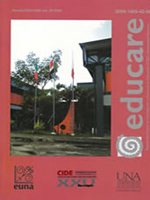La concepción de “ser humano” en Pablo Freire
DOI:
https://doi.org/10.15359/ree.12-1.3Keywords:
human been, existence, participacion with the world, emancipating pedagogyAbstract
This article analizes how Pablo Freire, one of the main education theoreticians with broad trajectory and world influence and with a big contibution to what it is known as alternative pedagogy, conceives the human been and his participation in and with the world. He has built his conception on this matter through several publications, merged from his teaching practice.References
Farré, L. (1968). Antropología Filosófica. El hombre y sus problemas. Madrid, España: Ediciones
Guadarrama.
Freire, P. (1975). Pedagogía del oprimido ( 14° ed. ). México: Siglo XXI Editores.
Freire, P. (1976). La educación como práctica de la libertad (17ª ed.). México: Siglo XXI
Editores.
Freire, P. (1977). Cartas a Guinea Bissau: apuntes de una experiencia pedagógica en proceso.
México: Siglo XXI Editores.
Freire, P. (1990). La importancia de leer y el proceso de liberación (7° ed.). México: Siglo XXI
Editores.
Freire, P. (1990). La Naturaleza política de la educación. Cultura, poder y liberación. España:
Ediciones Paidós.
Freire, P. (1992). Pedagogía de la esperanza: un reencuentro con la pedagogía del oprimido.
México: Siglo XXI Editores.
Freire, P. (1996). Cartas a Cristina. Reflexiones sobre mi vida y mi trabajo. México: Siglo XXI
Editores.
Freire, P. (1997). Pedagogía de la autonomía. Saberes necesarios para la práctica educativa.
México: Siglo XXI Editores.
Gabriel, M. (1964). El misterio del Ser. Buenos Aires, Argentina: Editorial Sudamericana.
Olarte, T. (1974). El ser y el hombre. San José: Editorial Fernández Arce.
Downloads
Published
How to Cite
Issue
Section
License
1. In case the submitted paper is accepted for publication, the author(s) FREELY, COSTLESS, EXCLUSIVELY AND FOR AN INDEFINITE TERM transfer copyrights and patrimonial rights to Universidad Nacional (UNA, Costa Rica). For more details check the Originality Statement and Copyright Transfer Agreement
2. REUTILIZATION RIGHTS: UNA authorizes authors to use, for any purpose (among them selfarchiving or autoarchiving) and to publish in the Internet in any electronic site, the paper´'s final version, both approved and published (post print), as long as it is done with a non commercial purpose, does not generate derivates without previous consentment and recognizes both publisher's name and authorship.
3. The submission and possible publication of the paper in the Educare Electronic Journal is ruled by the Journal’s editorial policies, the institutional rules of Universidad Nacional and the laws of the Republic of Costa Rica. Additionally, any possible difference of opinion or future dispute shall be settled in accordance with the mechanisms of Alternative Dispute Resolution and the Costa Rican Jurisdiction.
4. In all cases, it is understood that the opinions issued are those of the authors and do not necessarily reflect the position and opinion of Educare, CIDE or Universidad Nacional, Costa Rica. It is also understood that, in the exercise of academic freedom, the authors have carried out a rogorous scientific-academic process of research, reflection and argumentation thar lays within the thematic scope of interest of the Journal.
5. The papers published by Educare Electronic Journal use a Creative Commons License:














 The articles published by Educare Electronic Journal can be shared with a Creative Commons License:
The articles published by Educare Electronic Journal can be shared with a Creative Commons License: 



